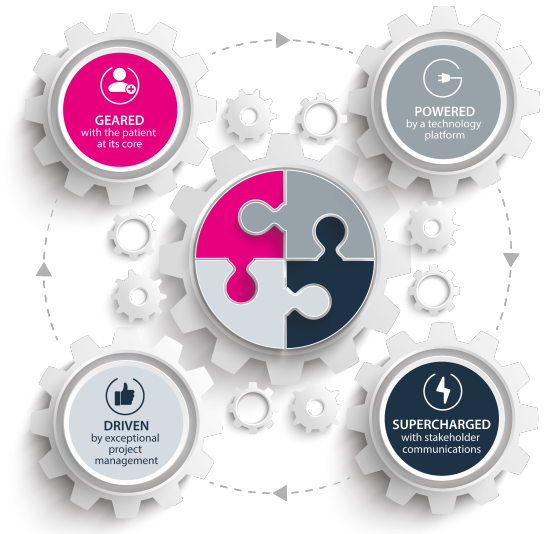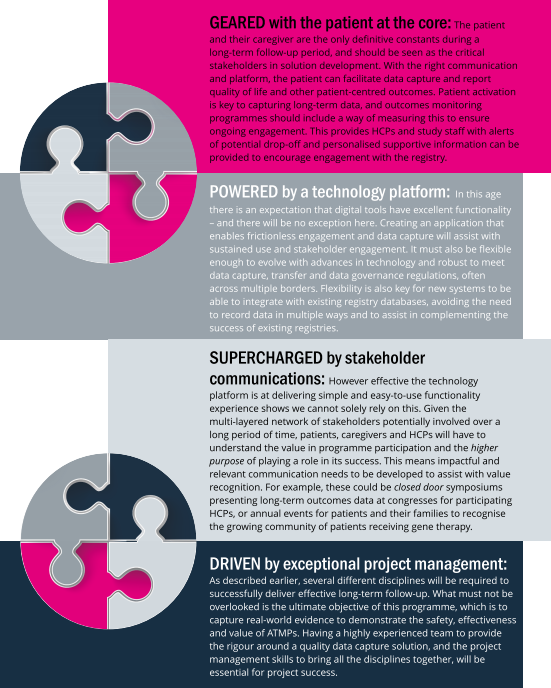Insights / Articles
Generating data on long-term outcomes to demonstrate the value of gene and other advanced therapies
Written by Gavin Jones, Global Advisor, Rare Disease on Wednesday, August 4, 2021
*This article was first published in Rare Revolution Magazine, Issue no. 013, Autumn, 2019.
Gene therapy and advanced cell-based therapies offer patients hope and the potential to make them chronically well. Long-term monitoring of patients to collect outcomes data after treatment with these therapies will be standard practice for the foreseeable future; it will therefore be necessary for bio-pharma and health system stakeholders to find effective ways to develop sustainable data capture programmes that meet regulatory requirements and demonstrate value. OPEN Health explores possible ways of supporting the unprecedented need for high-quality and sustained data capture.
Bio-pharma are required to adhere to strict regulations set by the Food and Drug Administration (FDA), United States, and the European Medicines Agency (EMA), Europe, on monitoring long-term outcomes when launching advanced therapeutic medicinal products (ATMPs). They request that large groups of patients are followed up for many years to assess long-term safety and efficacy. In addition, any novel pricing mechanism to support the reimbursement of these one or few-time treatments will require that processes to ensure that robust generation of outcome data is achievable in the long term. These requirements are truly unprecedented, with existing registry models and methodologies unlikely to offer sustainable and cost-effective solutions to these challenges.
Therefore, new models need to be identified. However, to truly meet the needs of all stakeholders involved, it is important to first recognise some of the specific challenges that may be encountered when generating long-term outcome data. From a patient perspective, and if ATMPs fulfil their promise, post-treatment disease symptoms may be considerably reduced or even non-existent. It means that ongoing contact between patients and their healthcare team may become limited, and this could be a key factor that leads to patients being lost to follow-up. Add to this the likely scenario of changes in the healthcare setting (e.g. from a treatment initiation centre back to the referring physician) and significant life changes (e.g. from adolescence into adulthood), monitoring patient outcomes may become increasingly more difficult.
From a health system perspective, it is likely that ATMPs will continue to be introduced in a small number of specialised treatment centres. Connectivity between healthcare professionals (HCPs) across the referral and treatment pathway could be complex, responsibilities for data input may not be clear, and governance arrangements for transferring data between settings are also likely to be complicated. This means that it will be challenging to work with all HCPs and centres involved in a patient’s ongoing care from a logistical and cost perspective.
So, there are multiple challenges involved in monitoring long-term outcomes where there is little precedent. Solutions need to be well thought out, multi-functional and innovative to have any chance of success.
Long-term outcome monitoring after treatment with an ATMP is exciting because it offers a platform for positive partnerships between HCPs, patient groups and bio-pharma to enable better outcomes. This is truly unprecedented and more involved than previous solutions to the challenges facing a registry. Early experience with existing gene therapies has shown that long-term outcome monitoring can be challenging, but with the right combination of capabilities and technology, we are confident it is eminently possible.
We recommend using the following strategic framework to build an effective solution:


CAN WE HELP?
For information about OPEN Health’s services and how we could support you, please get in touch.
JOIN US
Visit our careers page to view opportunities at OPEN Health.